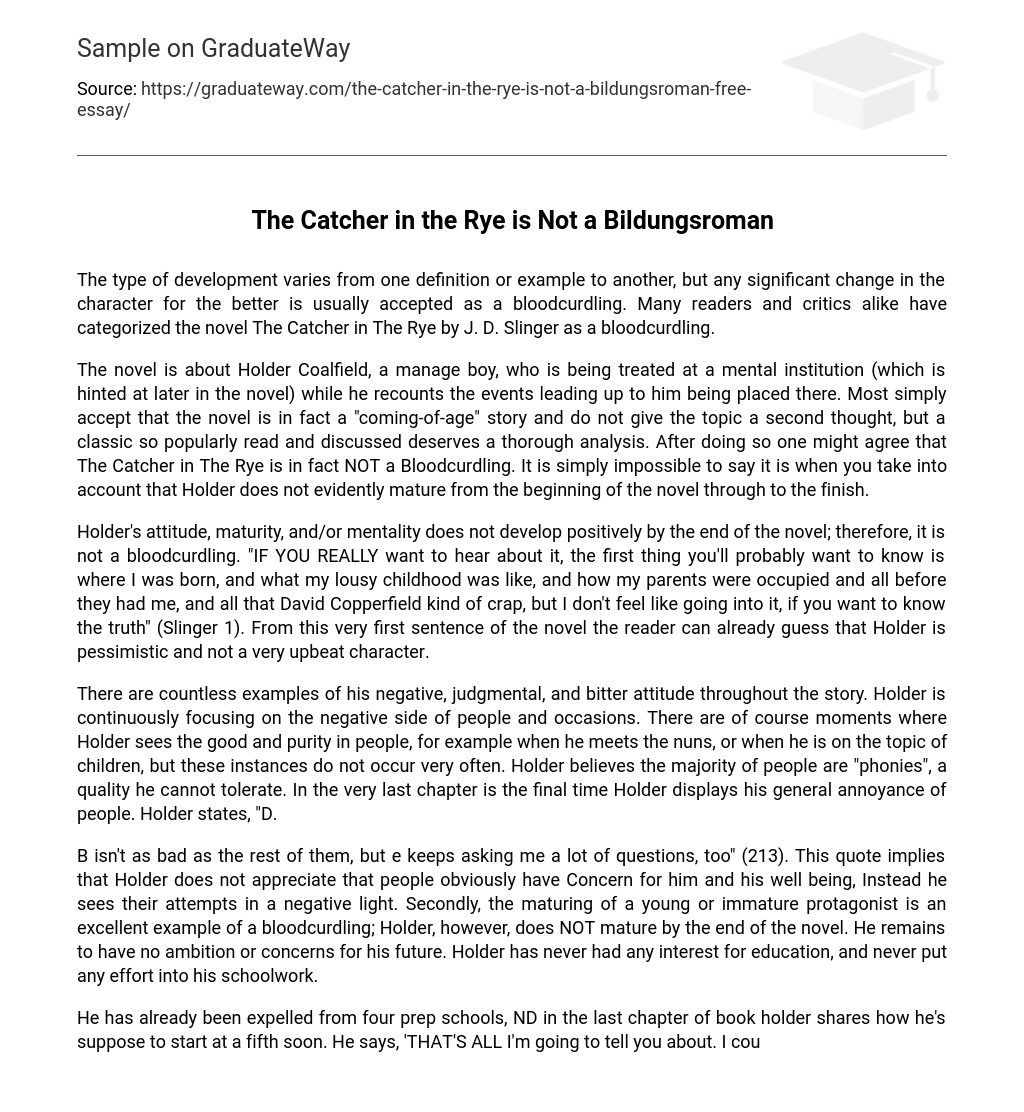The type of development varies from one definition or example to another, but any significant change in the character for the better is usually accepted as a bloodcurdling. Many readers and critics alike have categorized the novel The Catcher in The Rye by J. D. Slinger as a bloodcurdling.
The novel is about Holder Coalfield, a manage boy, who is being treated at a mental institution (which is hinted at later in the novel) while he recounts the events leading up to him being placed there. Most simply accept that the novel is in fact a “coming-of-age” story and do not give the topic a second thought, but a classic so popularly read and discussed deserves a thorough analysis. After doing so one might agree that The Catcher in The Rye is in fact NOT a Bloodcurdling. It is simply impossible to say it is when you take into account that Holder does not evidently mature from the beginning of the novel through to the finish.
Holder’s attitude, maturity, and/or mentality does not develop positively by the end of the novel; therefore, it is not a bloodcurdling. “IF YOU REALLY want to hear about it, the first thing you’ll probably want to know is where I was born, and what my lousy childhood was like, and how my parents were occupied and all before they had me, and all that David Copperfield kind of crap, but I don’t feel like going into it, if you want to know the truth” (Slinger 1). From this very first sentence of the novel the reader can already guess that Holder is pessimistic and not a very upbeat character.
There are countless examples of his negative, judgmental, and bitter attitude throughout the story. Holder is continuously focusing on the negative side of people and occasions. There are of course moments where Holder sees the good and purity in people, for example when he meets the nuns, or when he is on the topic of children, but these instances do not occur very often. Holder believes the majority of people are “phonies”, a quality he cannot tolerate. In the very last chapter is the final time Holder displays his general annoyance of people. Holder states, “D.
B isn’t as bad as the rest of them, but e keeps asking me a lot of questions, too” (213). This quote implies that Holder does not appreciate that people obviously have Concern for him and his well being, Instead he sees their attempts in a negative light. Secondly, the maturing of a young or immature protagonist is an excellent example of a bloodcurdling; Holder, however, does NOT mature by the end of the novel. He remains to have no ambition or concerns for his future. Holder has never had any interest for education, and never put any effort into his schoolwork.
He has already been expelled from four prep schools, ND in the last chapter of book holder shares how he’s suppose to start at a fifth soon. He says, ‘THAT’S ALL I’m going to tell you about. I could probably tell you what did after I went home, and how I got sick and all, and what school I’m suppose to go to next fall, after I get out of here, but I don’t feel like it. I really don’t. That stuff doesn’t interest me too much right now. A lot Of people, especially this one psychoanalyst guy they have here, keeps asking if I’m going to apply myself when I go back to school next September. It’s such a stupid question, in my opinion.
I mean how do you know what you’re going to do before you do it? The answer is you don’t. I think I am, but how do know? Swear it’s a stupid question” (213). Holder clearly still has no ambitions and goals; he has the same viewpoint on his education and future as he did in the beginning of his story. Lastly, as it becomes evident quite early into the novel, Holder is not completely mentally sTABLE. He might not necessarily have a mental disorder, although he clearly does not have healthy thoughts or behaviors. Holder expresses his negative thoughts on more than one occasion, a couple of examples are: “l felt so lonesome, all Of a sudden.
I almost wished I was dead” (46), and, ” I was feeling sort of lousy. Depressed and all. I almost wished I was dead” (83). Those are just two of the many instances Holder shares that he is feeling generally depressed. Whether he has clinical depression, a personality disorder, or just an excess of hormones is beside the point. Holder was introduced to the reader as a mentally conflicted teenage boy. By the time the novel nears to an end it is unveiled that he is in a mental institution and is meeting with a psychoanalyst (213), which unequivocally roves that he has not improved psychologically.
Holder Coalfield from The Catcher in the Rye is an immuTABLE character throughout the novel, although there are many who disagree, this would signify that the book would seemingly not be a bloodcurdling. Holder’s attitude, maturity, and/or mentality do not change for the better by the conclusion of Clinger’s novel, which makes it hardly possible to consider the book to be a bloodcurdling or a “coming-of-age” novel.





